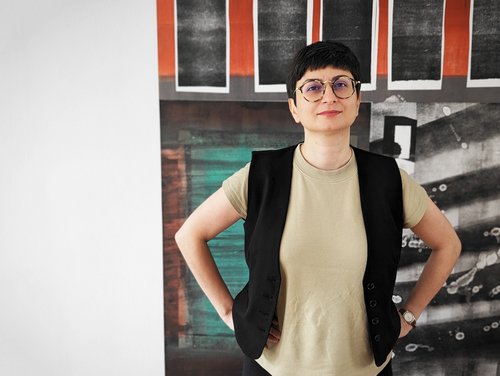Spotlight: Elaheh Mohammadi

Elaheh Mohammadi worked as a Marie Curie Sklodowska Curie Fellow at IHS from 2022 to 2024.
When did you start working at IHS?
I began working here almost two years ago as a Marie Curie (precisely MSCA) fellow. However, I was already familiar with IHS at that point because I had been an external fellow since 2020, towards the end of my doctoral studies. In the spring of 2022, I was awarded the Marie Curie (MSCA) grant and began working at IHS on my research under the supervision of Dr. König.
Your research project ended in May. What is it about?
The project is called “Understanding the Role of Diversity in European Research”. I wanted to study academic cultures in Europe to explore how value is attributed to knowledge and how leading European scholars, who are the gatekeepers of academia, distribute knowledge resources in Social Sciences and Humanities. Since research grants and fellowships are excessively important in academic evaluations, I focused on peer review of social sciences and humanities research grants. The most prestigious peer review evaluations claim to rely heavily on the concept of “excellence”. What I have been doing with my research is focusing on the contradictions innate to “peer review” as the “golden standard” of academic evaluation. I also analyze how the boundaries of ethics and science are drawn and how they are used to evaluate good research. The analyses are based on quantitative analysis of panel settings and qualitative research, which centres on an analysis of in-depth interviews with a group of panel chairs and members of the European Research Council (ERC) Social Science and Humanities panels over ten years between 2010 and 2020.
What were the main findings of the project?
We did a quantitative analysis of the ERC panel sets across ten years to make a data set of ERC panel sets, which allowed us to observe several patterns concerning the composition of the panels and the regularity and recruitment of panelists. Based on this, we proposed a systematic approach to selecting interview informants for expert interviews and information about the overall structure of the population of the ERC panels, which we discuss in an article currently in peer review.
As for the assessment criterion and the role of diversity, “excellence” is emphasized as the assessment criterion. This sometimes means that “excellence” has incorporated broader criteria of “impact,” including “social impact” when defined by the ERC's “bottom-up” process. Initially, both “excellence” and “diversity” emerged in management and found their way into academia, and both are contested concepts and fuzzy virtues. From the analysis of interviews, we see that diversity is not always perceived by panelists as pollution, what they call “bias” in the evaluation of “excellence”. Depending on how diversity is understood and around what parameter, “diversity” is perceived as a virtue or vice. For those who engage in discussing diversity as an important criterion of social impact in the evaluation of the overall performance of the ERC, “diversity” is located in ethical aspects and is a different assignment from the scientific valuation of research and a researcher.
How was your experience working at IHS?
I worked mainly with Thomas König, which was a wonderful experience because of his expertise in science policy at the national and the EU level and his particular insight into the ERC. In terms of intellectual exchange, what I found particularly helpful were the monthly gatherings we organized with Thomas and a group of IHS fellows who have been engaged in different ways in science policy to discuss our research proposals and articles. In addition to the scientific exchange with researchers, colleagues at Projekt Support, HR, IT, Library, and Finance are lovely and helpful. Oh, and don’t we have the best Event team at IHS? I organized two international workshops as part of my MSCA fellowship with the IHS Event team, and they just do a perfect job!
What are your plans for the future?
Next fall, I will be a visiting scholar in the Department of Sociology at Columbia University. I am planning to do a pilot comparative exploration of ERC and National Science Foundation (NSF) humanities and social sciences. The ERC was invented as a European copy after the NSF in the United States. However, because the EU policy is organized differently from the US, the ERC is built upon a completely different policy template, Thomas points this out in one of his publications. I want to explore this as a travelling idea through a comparative study of the two funding agency evaluation processes in order to understand the peculiarities of the international European context from which the ERC has emerged. This pilot study lays the groundwork for a project proposal after my MSCA project.
